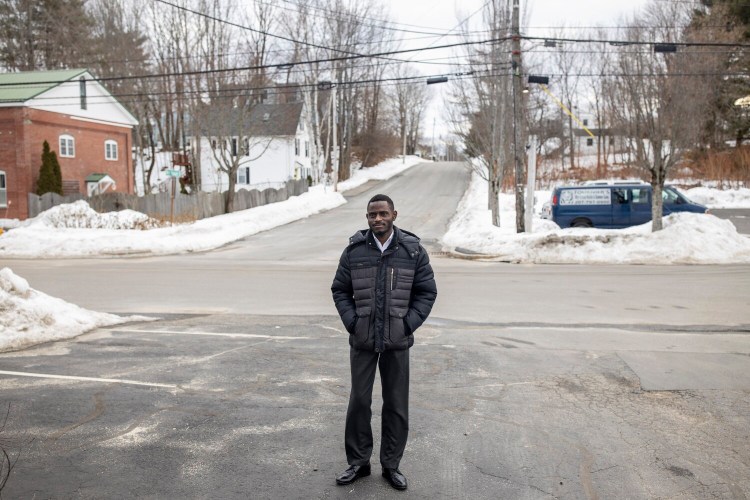Jerry Mopembe came from the Democratic Republic of the Congo to the United States five years ago.
Since then, the human resources specialist has learned a thing or two about living in his adopted country. Now, he’s often a person that more recent immigrants in Greater Portland seek out for answers on how to find a job, rent an apartment and any number of everyday activities that can be difficult for a newcomer with limited English skills.

Jerry Mopembe says he was eager to join Portland’s first group of Natural Helpers. “I like to help people.” Brianna Soukup/Staff Photographer Buy this Photo
So when Mopembe learned that the city of Portland was establishing a Natural Helpers program to connect recent immigrants with more experienced peers, he was eager to participate.
“I like to help people,” Mopembe said. “So many people come to me because they know I have an HR background. And because I used to work for the New Mainers Resource Center at Portland Adult Education, I know immigrants from many different places.”
Portland’s Office of Economic Opportunity plans to tap the newcomer experiences of Mopembe and others like him to connect recent immigrants to services, supports and other resources that may help foster a greater sense of inclusion or belonging in the wider community.
Forty-five community leaders ages 18 to 80 and from 18 countries applied to serve as helpers, said Julia Trujillo Luengo, director of the economic opportunity office. Fifteen finalists, representing 11 countries, were selected to be trained and serve in the first cohort of the program, which launches Feb. 11.
Developed in partnership with the University of Southern Maine, the Natural Helpers program will provide two days of leadership training and instruction on resources available throughout the city.
Once trained, the team will help new arrivals seek employment, access housing or medical care, enroll children in school or day care, navigate public transportation, locate ethnic food stores, visit museums, attend sports events and more.
“They will draw on their own experiences and deep connections within the community, serving as a resource that will allow us to continue fostering a sense of inclusion in all aspects of city life,” Luengo said. “It’s a wholistic approach.”
With a little help from experienced peers, new arrivals can accomplish more, become financially stable, develop connections in the community and be more happy and successful overall in their new home, she said.
The first group of Natural Helpers speak a wide variety of languages representing the linguistic minorities of Greater Portland, including French, Arabic, Lingala, Swahili, Spanish and Portuguese, Luengo said.
Natural Helpers is a peer-assistance program used in several countries to access the servant-leaders who naturally exist in every community. Some are set up in schools to provide peer guidance counseling and prevent suicide. The Portland program is modeled after an immigrant-based Natural Helpers program in Aurora, Colorado, one of 10 like it across the United States.
Luengo hopes the Natural Helpers program will help service providers connect with recent immigrants they’re trying to reach, and allow them to learn from each other as well.
Jerry Mopembe said he’s looking forward to the leadership training and being able to provide newcomers with reliable information about living, working and having fun in Greater Portland.
“People get information from so many different sources,” Mopembe said. “It’s important to have reliable sources.”
Send questions/comments to the editors.


